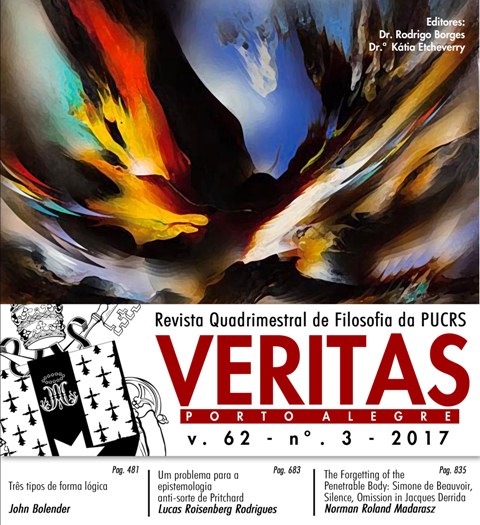Uma solução baseada no realismo experimental para dois argumentos pessimistas
DOI:
https://doi.org/10.15448/1984-6746.2017.3.28684Palabras clave:
Indução Pessimista, Problema das alternativas não concebidas, Realismo experimental, Realismo causal.Resumen
No presente trabalho procurarei expor dois desafios antirrealistas ancorados na história da ciência, que Stanford (2006) apelidou respectivamente de ‘antiga’ e ‘nova indução pessimista’. Argumentarei que existe uma solução realista já disponível a ambos os desafios pessimistas: o realismo experimental, inicialmente proposto por Hacking (1983) e Cartwritght (1983), segundo o qual é possível comprometer-se com entidades teóricas com as quais desenvolvemos interações causais e com as quais produzimos fenômenos controlados, sem que tal compromisso se estenda às teorias mesmas. Tomarei como parâmetro não propriamente os argumentos de Hacking e Cartwright que sofrem inúmeras críticas, mas uma formulação sofisticada do realismo experimental proposta por Egg (2012).
Descargas
Citas
CARTWRIGHT, N. How the Laws of Physics Lie. Oxford: Clarendon, 1983. DOI: https://doi.org/10.1093/0198247044.001.0001
CARVALHO, Fábio Tenório de. Inferir Explicações e Explicar Inferências:Uma abordagem pragmático-transcendental da Inferência à Melhor Explicação. Tese de Doutorado, UFMG, 2013.
CHAKRAVARTTY, Anjan. A Metaphysics for Scientific Realism: Knowing the Unobservable. Cambridge University Press, 2007. DOI: https://doi.org/10.1017/CBO9780511487354
______. What you don't know can't hurt you: Realism and the unconceived. Philosophical Studies 137 (1):149 - 158 (2008). DOI: https://doi.org/10.1007/s11098-007-9173-1
EGG, Matthias. Causal Warrant for Realism about Particle Physics. Journal for General Philosophy of Science / Zeitschrift für Allgemeine Wissenschaftstheorie 43 (2):259-280 (2012). DOI: https://doi.org/10.1007/s10838-012-9202-4
______. Expanding Our Grasp: Causal Knowledge and the Problem of Unconceived Alternatives. British Journal for the Philosophy of Science (2014) 67 (1):axu025. pp.1-27.
HACKING, Ian. Representing and Intervening: Introductory Topics in the Philosophy of Natural Science. Cambridge University Press, 1983. DOI: https://doi.org/10.1017/CBO9780511814563
HITCHCOCK, Christopher Read. Causal explanation and scientific realism. Erkenntnis (1992) 37 (2):151 - 178. DOI: https://doi.org/10.1007/BF00209320
KITCHER, Philip. The Advancement of Science: Science Without Legend, Objectivity Without Illusions. Oxford University Press, 1993.
KUHN, Thomas S. The Structure of Scientific Revolutions Vol.. The University of Chicago Press, 1962.
LAUDAN, Larry. A confutation of convergent realism. Philosophy of Science 48 (1):19-49 (1981). DOI: https://doi.org/10.1086/288975
LIPTON, Peter. Is the Best Good Enough? Proceedings of the Aristotelian Society 93:89-104 (1993). DOI: https://doi.org/10.1093/aristotelian/93.1.89
______. Truth, existence, and the best explanation. In A. A. Derksen (ed.), The Scientific Realism of Rom Harré. Tilburg University Press, 1994.
LYONS, Timothy D. Scientific Realism and the Pessimistic Meta-modus Tollens. In CLARKE, Steve; LYONS, Timothy D (eds.). Recent Themes in the Philosophy of Science: Scientific Realism and Commonsense. Dordrecht: Kluwer, 2002, pp 63–90. DOI: https://doi.org/10.1007/978-94-017-2862-1_4
PIERSON, Robert & REINER, Richard. Explanatory warrant for scientific realism. Synthese 161 (2):271 – 282 (2008). DOI: https://doi.org/10.1007/s11229-007-9159-8
PSILLOS, Stathis. Scientific realism and the 'pessimistic induction'. Philosophy of Science 63 (3):314 (1996). DOI: https://doi.org/10.1086/289965
______. Scientific Realism: How Science Tracks Truth. Routledge, 1999.
PUTNAM, H. Mathematics, Matter and Method. Cambridge University Press, 1975.
SANKEY, Howard. Scientific Realism. Theoria 48 (98):35-54 (2001). DOI: https://doi.org/10.3167/004058101782485548
SKLAR, L. Do unborn hypotheses have rights? Pacific Philosophical Quarterly 62, 17–29 (1981). DOI: https://doi.org/10.1111/j.1468-0114.1981.tb00039.x
STANFORD, P. Kyle. Exceeding Our Grasp: Science, History, and the Problem of Unconceived Alternatives. Oxford University Press, 2006. DOI: https://doi.org/10.1093/0195174089.001.0001
SUÁREZ, Mauricio. Experimental realism reconsidered: How inference to the most likely cause might be sound. In CARTWRIGHT, N; HARTMANN, S; HOEFER, C & BOVENS, L. (eds.). Nancy Cartwright's Philosophy of Science. Routledge, 2008, pp. 137-163
VAN FRAASSEN, Bas C. A imagem científica. Trad. Luiz Henrique de Araújo Dutra. Editora Unesp; Discurso Editorial, 2007.
VICKERS, Peter. A Confrontation of Convergent Realism. Philosophy of Science 80 (2):189-211 (2013). DOI: https://doi.org/10.1086/670297
WOODWARD, James. Making Things Happen: A Theory of Causal Explanation. Oxford University Press, 2003. DOI: https://doi.org/10.1093/0195155270.001.0001
Descargas
Publicado
Cómo citar
Número
Sección
Licencia
Derechos de Autor
La sumisión de originales para la Revista Veritas implica la transferencia, por los autores, de los derechos de publicación. El copyright de los artículos de esta revista es el autor, junto con los derechos de la revista a la primera publicación. Los autores sólo podrán utilizar los mismos resultados en otras publicaciones indicando claramente a Revista Veritas como el medio de la publicación original.
Creative Commons License
Excepto donde especificado de modo diferente, se aplican a la materia publicada en este periódico los términos de una licencia Creative Commons Atribución 4.0 Internacional, que permite el uso irrestricto, la distribución y la reproducción en cualquier medio siempre y cuando la publicación original sea correctamente citada. Copyright: © 2006-2020 EDIPUCRS






